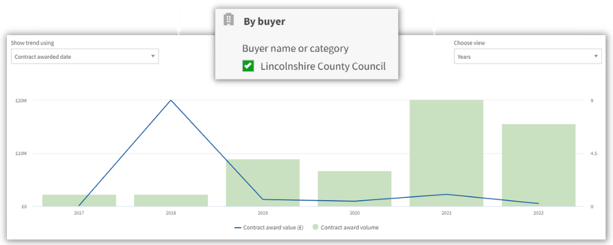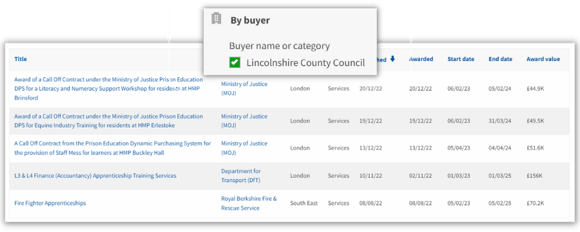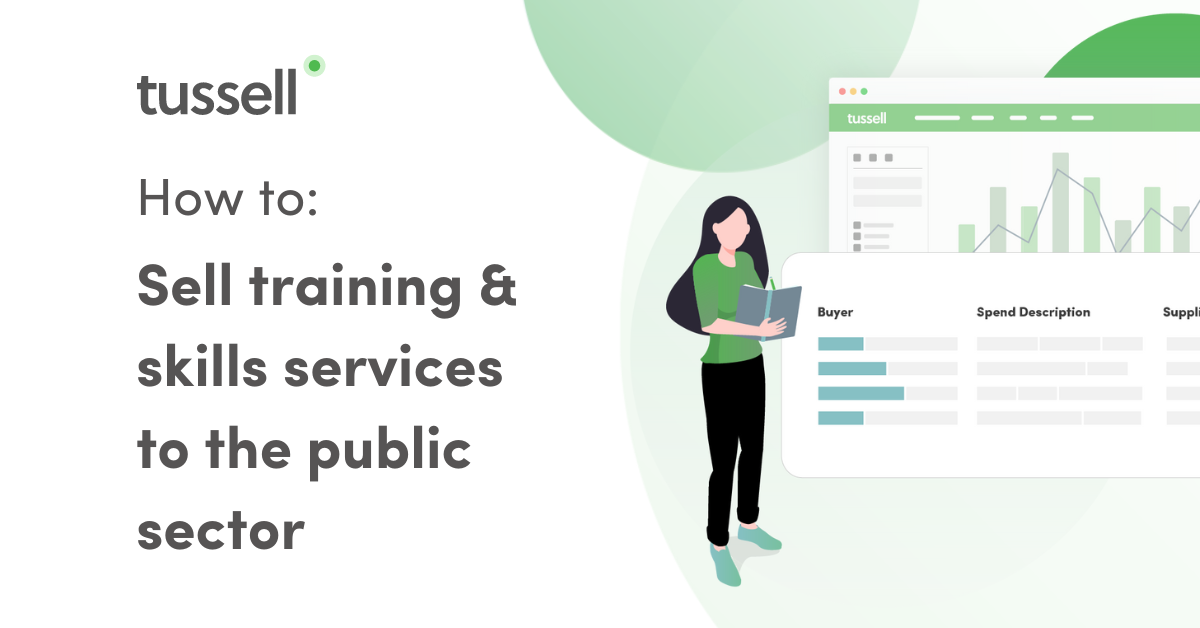Selling to the public sector is a complex and difficult task, let alone selling to one of the most entrenched markets within it - training & skills services.
In this blog, we run through our 5 top tips that you need to employ to boost your public sector training & skills services sales, and show you how Tussell's public sector market intelligence platform could help you along the way.
💭 1. Understand & profile your targets
First, you've got to know who you're selling to. You need to build a detailed picture of your target accounts, and be able to answer questions like:
-
What are their training & skills objectives? Do they have a broader strategy in place?
-
What kind of training & skills programmes do they already run?
-
Are they already procuring my kind of training & skills services, and if so from whom?
-
Which providers are they turning to most frequently? How long have they been working together?
-
When do they typically buy these services, and which routes to market do they use?
The answers to these questions will form the basis of your strategy for selling to your target accounts - or, equally, help you decide whether an account is really worth your time.
But how do you begin to answer them?
Broader training & skills objectives can be gathered by combing through your accounts' key policy documents: see, for example, Birmingham City Council's 'Skills & Employment Plan: 2016 to 2026'. These kinds of documents help paint a picture of which particular training & skills services may grow in demand to help meet their broader objectives.
How your accounts are actually delivering on these objectives through procurement is a more quantitative affair. You can use open procurement portals - like Find a Tender, or a local portal specific to your account - to trace who your target accounts have awarded training & skills contracts to in the past, for how much, and by which means.
Annoyingly, gathering this data at scale through these platforms is very tedious and time-consuming. Tussell lets you find the same answers - and more - in a matter of seconds.
Using our pre-made training & skills filter, for example, we can see that Lincolnshire County Council has awarded over £25 million worth of such contracts since 2016, and has worked heavily with the likes of Riverside Training and the Inspire Education Group.

See who's already doing business with your target accounts
You can read more about how to profile your target account in our free how-to resource: "How to profile a target account in the public sector".
🚏 2. Understand your routes to market
There are lots of different ways to sell your training & skills services to the public sector.
A fundamental question you should ask yourself from the start is whether bidding on a tender is the right thing to do, or whether other routes to market might be more fruitful.
Smaller companies, such as SMEs and start-ups, may be more successful if they work with a larger company who leads on the contract, or if they are subcontracted through a tier-2 service provider approach. Once a supplier is awarded a contract, you can begin asking how you might work with them in delivering their contractual agreements, rather than being the main service provider. Building a relationship with the supplier in this way will let them get to know you and get your name out there - this could prove to make you more successful in gaining contracts in the future.
An alternate route to market is through frameworks and dynamic purchasing systems (DPSs).
Frameworks consist of a list of pre-approved suppliers who have been evaluated and selected to provide a predefined set of products and services. This allows them to bid on specific contracts without having to go through the usual full procurement process. Frameworks can be advantageous for contracting authorities as once established call-offs can be made without a full procurement process having to be undertaken each time, as the terms and conditions have already been established.
Tussell's frameworks analytics shows that from 2016 - 2022, nearly 1,700 training & skills-related contracts were awarded via a framework agreement or DPS, totalling over £340 million in value. Simply put, if you're not harnessing the right framework agreements you are missing out on millions of pounds worth of opportunities.
Find out how to find the best framework for you on our how-to blog "Procurement frameworks: how to find them".
⏰ 3. Be proactive, not reactive
If you're new to selling your training & skills services to the public sector, you need to appreciate one key thing: being proactive, not reactive, is key to long-term success in this market.
What does this mean in practice?
First, rather than bidding on a tender as and when they're published, build an understanding of - and, ideally, a relationship with - the tendering authority before the tender is released. Understand their needs; track how successfully the current contract is being delivered by the incumbent; pick out an authority's main priorities, concerns and issues by sifting through their published policy documents, the wording of prior contract awards, meeting minutes, and long-term strategy reports.
This will also enable you to write a more compelling, personalised bid once the contract comes up for renewal.
This process takes time. Lots of time! Critically, it requires you to proactively anticipate the contract's end date well in advance. With Tussell, you can easily see the end dates of contracts, and start building your relationship with the contracting authority ahead of time.
Tussell shows, for example, that Lincolnshire County Council has 5 training & skills-related contracts rolling-off in the next 24 months: how could you position yourself to win these if and when they come up for renewal?

Get ahead of opportunities in the public sector
📊 4. Back it up with evidence
When selling to the public sector, your reputation proceeds you.
This is especially important in the training & skills services market. Government needs to be reassured - either by word of mouth or quantitative results - that your programmes actually deliver results.
Whether you are a big or small company, you can build your reputation.
Collecting customer case studies and testimonials from companies you have sold training and skills services to is a great way to start building your reputation. Alongside this, you can write blogs and articles giving insights into the training and skills sector - demonstrating that you know what you are talking about!
All companies trying to sell training and skills services should not underestimate the power of social media. You can use social media platforms to find groups that your potential customers are in and get involved: a group on LinkedIn called "Freelance Trainers, Consultants and Advisers for Technology, Soft Skills, Management Services", for example, has over 16,000 members and contains posts sharing advice and opportunities from other professionals and companies working within the training and skills services market in the public sector.
Contributing to and leading discussions within these kinds of circles helps show prospects that you're an authoritative presence in your category.
The same can be said for attending relevant events. Buying a booth or speaking at, say, a government procurement conference, can go a long way to make your presence in the market known, and provide excellent opportunities to meet and build relationships with prospects.
📣 5. Speak their language
Finally, selling training and skills services to the public sector it's critical that you speak their language!
Government is not a single entity. It is important to understand that you are effectively selling to a number of different organisations that all have their own executive, management, organisational, delivery, and budget structures. Attempting to sell to the government with the same marketing techniques that you use for the private sector will get you nowhere.
How, for example, do your prospects talk about training and skills services? Which keywords, terms and phrases regularly crop up? How do they envision training and skills services falling into their broader strategic aims? In what contexts do they talk about the need for training and skills services?
The answers to these questions can help you frame your outreach to them, and ensure you're using the most compelling language when drafting your bids.
The key takeaway is that you shouldn't assume that just because public sector prospects fall under similar categories - like Local Government, Central Government or NHS - that they understand or talk about training and skills services in the same way. Each entity is unique: speaking to them in a language that they specifically understand is key to building long-standing, effective relationships in this market.
*
Taking a proactive, data-led approach is key when tackling the public sector. By getting ahead of opportunities, using data to understand your target accounts, and making your presence known, you'll be on the right path to more business in this market.
We have lots more resources to help you sell more to government - check out some of our other how-to guides:
🟢 How to build a pipeline of public sector procurement opportunities
🟢 Procurement Frameworks: How to find the best ones for you
🟢 How to displace an incumbent in the public sector




%20v1.png)












